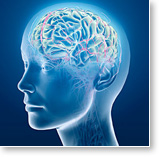 Keeping Your Prefrontal Cortex Online: Neuroplasticity, Stress and Meditation
Keeping Your Prefrontal Cortex Online: Neuroplasticity, Stress and Meditation
The Huffington Post (August 12) reported on recent research, conducted at American University in Washington, D.C., which shows that the daily practice of the Transcendental Meditation technique creates more efficient, integrated brain functioning.
The unique experience of “transcending” gained during TM practice, writes journalist Jeanne Ball, neutralizes the stress, which negatively impacts brain functioning.
“When we are overly tired or under intense mental, emotional or physical stress, our brain tends to bypass its higher, more evolved rational executive circuits, defaulting to more primitive stimulus/response pathways. We respond to challenges without thinking, making impulsive, shortsighted decisions. When the brain’s CEO goes ‘offline,’ strong emotions such as fear and anger can adversely color or distort our perception of the world,” Ms. Ball writes.
Ms. Ball emphasizes the positive effect of TM practice on the brain’s prefrontal cortex—said to be the brain’s executive center. This key part of the brain plays a crucial role in judgment and decision-making.
“Interestingly, the brain’s crucial frontal area is where the highest levels of EEG coherence are typically recorded during TM practice, indicating improved communication between the prefrontal cortex and other parts of the brain,” Ms. Ball reports.
CLICK HERE to read this article at the Huffington Post website.
Watch a short video of brain researcher Dr. Fred Travis explaining how the Transcendental Meditation program improves brain functioning.




